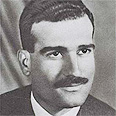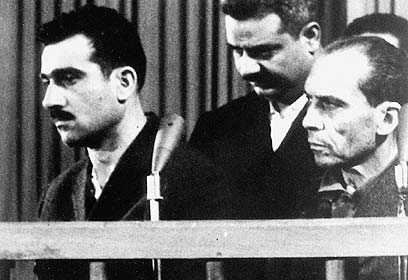
'Eli knew someone betrayed him'
New revelations concerning Israeli spy Eli Cohen's last days in Damascus' prison suggest he believed he was double-crossed by his associates
"I don't regret what I have done, only what I could have done and didn’t have the chance to do. Sometimes close friends fail those who can act" – this was the last statement apparently made by Israeli spy Eli Cohen in 1965, carved onto his prison walls just days before he was executed.
Cohen was on an intelligence gathering mission in Syria when he was caught by Damascus security forces in January 1965, and later hung in Damascus' main square. The information he delivered is said to have been an important factor in Israel's success in the Six Day War.
Related stories:
- WUJS to Assad: Repatriate Eli Cohen Ex-Assad aide: Eli Cohen's burial site unknown Spy: Eli Cohen died because of failure
This new testimony was brought to light by Dawood Baghestani, a former Syrian prisoner who today serves as the editor in chief of the English-language "Israel-Kurd" magazine, which is published in Kurdistan.
Eli Cohen (left) during his trial (Photo: AFP)
Baghestani met Sunday with Cohen's widow Nadia and his younger brother Avraham. The meeting was set up by Professor Shmuel Moreh, emeritus professor of Arabic literature at the Hebrew University in Jerusalem.
"We've been corresponding via email for years," Moreh told Yedioth Ahronoth on Monday. "Last week he told me that in the early 1970s he was arrested by the Syrians and that his guards told him he was being held in the same cell as Eli Cohen was."
According to Moreh, while in prison Baghestani discovered sentences signed by Cohen carved into the cell walls. They said that Cohen did not regret his actions and was aware of the fact that some – who were under the impression they were helping him – were actually impeding his actions.
"I knew Cohen's family had to hear it first hand, so I arranged this meeting," Moreh said.
Baghestani, who was imprisoned five years after Cohen was executed, said that some time after he was released, he met another Kurdish rebel who was held prisoner is Syria while Cohen was still alive. According to the other inmate, Cohen believed he was imprisoned "because of a close associate."
Eli Cohen's remains were never returned to Israel, despite repeat pleas to that effect. In 2008, the Syrian government said that Cohen's burial place was unknown.
Nadia Cohen implored Baghestani to use his contacts in the Arab world to try and locate her husband's remains, so they could be buried in Israel. Baghestani reportedly vowed to do everything in his power to help.
- Follow Ynetnews on Facebook
- Receive Ynetnews updates directly to your desktop











